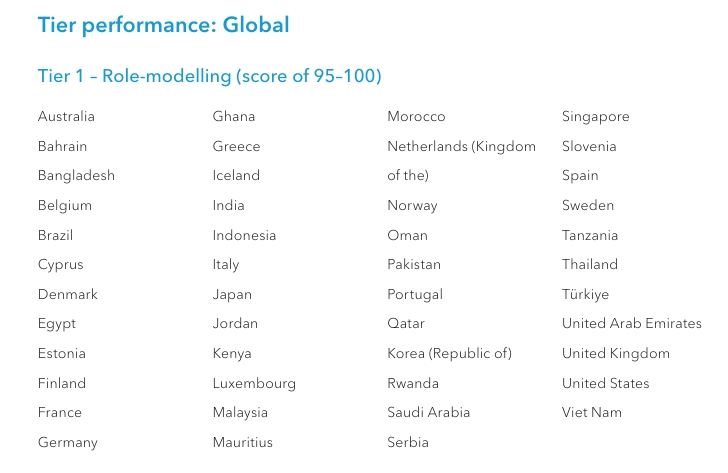
Vietnam is one of 46 countries ranked in tier 1 of the ITU's global cybersecurity index. (Photo: ITU)
The International Telecommunication Union (ITU) has ranked Vietnam among the top model nations in its 2024 Global Cybersecurity Index (GCI). This prestigious ranking underscores the country's robust cybersecurity measures and its status as a benchmark for global best practices.
The ITU's latest release of the GCI emphasizes that while nations worldwide are stepping up their cybersecurity defenses, there is a pressing need for more robust measures to address escalating risks.
ITU Secretary-General Doreen Bogdan-Martin stressed the importance of trust in the digital realm, stating: "Building trust in the digital world is paramount."
She highlighted the 2024 GCI's findings as a call to action, urging global efforts to manage security risks amidst growing digital complexity.
Vietnam's exceptional performance in the GCI is evident as it joins 45 other countries in tier 1, indicative of nations that serve as role models in cybersecurity.
The GCI assesses national efforts across five critical areas: legal, technical, organizational, capacity development, and cooperation, with the 2024 iteration introducing refined evaluation techniques to better measure each country's progress and impact.
Scoring a near-perfect total of 99.74 points, Vietnam achieved top marks in four out of the five criteria. The nation excelled in legal, technical, organizational, and cooperation measures, each scoring 20 points, while capacity development garnered 19.74 points.
Legal frameworks form a crucial pillar of cybersecurity globally, with 177 countries implementing at least one regulation concerning personal data protection, privacy, or breach notification.
Additionally, 139 countries have established Computer Incident Response Teams (CIRT) at various developmental stages, and 132 have adopted a National Cybersecurity Strategy (NCS).
Efforts to raise cyber awareness are also widespread, with 152 countries launching initiatives targeting the general populace, including vulnerable groups and minorities.
On the international front, 166 countries are engaged in treaties or cooperation mechanisms that enhance cybersecurity capabilities and facilitate information sharing.
Despite these collaborations, the ITU notes significant challenges in translating these agreements into effective, operational frameworks.
Moreover, 123 countries offer training programs for cybersecurity professionals, and 153 have integrated cybersecurity education into their academic curricula, ensuring a comprehensive approach to online safety.
Notably, 164 countries have enacted legal protections for children in the digital environment.
Initiated in 2015, the GCI aims to assist nations in pinpointing improvement areas and spurring actions to develop comprehensive cybersecurity capabilities.
As cyber threats evolve, the GCI continues to adapt, providing a detailed snapshot of global cybersecurity practices and promoting continuous advancement.
Du Lam